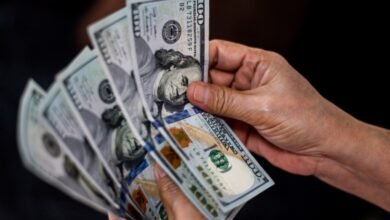Pound Sterling Surges Against US Dollar: Can the Rally Continue?
The bulls have woken the sleeping GBP/USD. Since mid-December 2023, the GBP/USD weekly chart has seen sideways trading activity. The past five trading days have seen a 1.55% increase in value, adding to a year-to-date .94% increase. The question becomes, will the rally continue? As the UK’s fiscal first quarter begins in April, a seasonal pattern of higher prices has occurred.

Source: Barchart
Technicals
For this article, I’ll reference the British Pound currency futures. A high correlation exists between the futures and the GBP/USD spot forex pair. Both assets’ charts move in the same direction.
Reviewing the weekly nearby futures chart, using the highest and lowest weekly closing prices, illustrates the sideways trading activity. This week’s price action has traded and closed outside the price consolidation. Typically, this is a bullish price pattern. Price action could be considered bullish if the weekly closes are not inside the weekly green rectangle.
Fundamentals
Some fundamentals have contributed to the recent price rally, which extended prices to highs not seen since July 2023.
- Fed Chairman Powell spoke this week and hinted at the possibility of lowering interest rates in the US due to a lower inflation trajectory. The response from US dollar traders was negative, pushing it down to lows not seen since mid-January 2024.
- At the same time, the Bank of England is expected to delay its first rate cut until August.
- Great Britain entered a recession after the last two-quarters of GDP declined. The government’s Spring Budget release revealed permanent tax cuts and projected upcoming GDP growth to stimulate the slowing economy.
- Bank of America turned bullish on the GBP this week, referring to the Spring Budget released this week, bullish seasonality during April, and technicals that support higher GBP prices.
Seasonal Pattern
In a recent article for Barchart, “British Pound Futures: Is Their Recession Going to Tumble the Pound?” I wrote, “When a country enters a recession, it signifies a significant economic downturn characterized by a contraction in economic activity. Events potentially facing the GBP are rising unemployment, reduced consumer spending, government intervention, and currency volatility. Adding to the selling pressure of the GBP, there will be a near-perfect seasonal pattern to sell as Britain heads into the end of its fiscal 4th quarter.”
I mentioned a seasonal sell pattern that has appeared for each of the past 15 years. There were other supporting factors as well. Unfortunately, that trade never materialized during the seasonal window, resulting in a loss on the trade. Losses happen in trading, but I wanted to bring this up because losses happen in trading, and I’m not perfect.
Here was a perfect seasonal pattern; it will have a 14 and 1 record next year. A quote I like applies here, “Some will, some won’t, so what, next trade.” Risk management still prevails regardless of how good the trade appears.

Source: Moore Research Center, Inc. (MRCI)
The above chart shows the seasonal pattern (blue line) and the sell pattern (red line). Looking at the price action, you can see that the market failed to follow its 15-year seasonal pattern.
The following seasonal pattern (yellow box) reveals that research has shown higher prices during this period. The seasonal buy pattern coincides with the first quarter of Great Britain’s fiscal year.
Jerry Toepke, editor at MRCI, reports, “The pound has regularly rallied from mid-March through April during the transition into a new British fiscal year.”
MRCI has found the GBP has closed higher on April 20 than on March 13 for 14 of the past 15 years. Two of these years did not have a daily closing drawdown.
Currently, the daily trend is up. Multiple fundamentals are supporting a weaker US dollar and a stronger GBP. And a seasonal pattern with a 93% success rate.
In conclusion
The GBP/USD pair has broken out of its sideways trading pattern, fueled by technical and fundamental factors. Fed Chairman Powell’s remarks on potential interest rate cuts in the US and the Bank of England’s expected delay in rate cuts have contributed to the pound’s rally. The UK’s Spring Budget release and bullish seasonal patterns further support the GBP’s upward momentum. Despite a historical sell pattern that failed to materialize this year, the current seasonal buy pattern, alongside a 93% success rate over 15 years, suggests continued strength in the pound. With the daily trend pointing upwards and multiple supporting fundamentals in play, the question is whether this rally will extend further.
More Forex News from Barchart
On the date of publication, Don Dawson did not have (either directly or indirectly) positions in any of the securities mentioned in this article. All information and data in this article is solely for informational purposes. For more information please view the Barchart Disclosure Policy here.
The views and opinions expressed herein are the views and opinions of the author and do not necessarily reflect those of Nasdaq, Inc.
Source link




